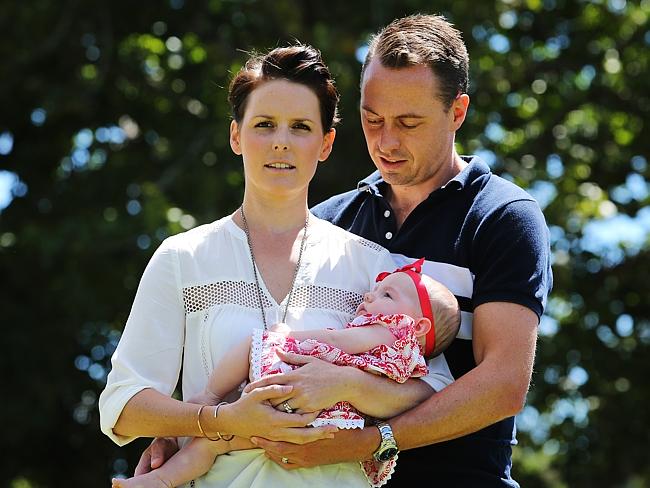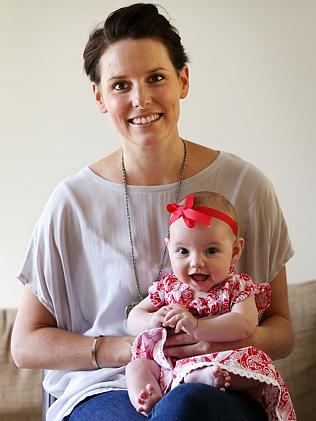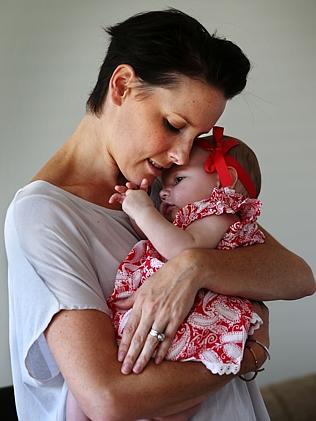Mother vows to fight advanced bowel cancer for her baby daughter
NURSING your newborn, the last thing you could ever imagine is leaving them — and that’s one thing Kate Vincent is determined not to do.
On Boxing Day, just three months after having beautiful baby Charlotte, the Newcastle 29-year-old was told she had advanced bowel cancer that had spread to her liver and lungs.
With no symptoms and no family history of the disease, she has vowed to fight the shock diagnosis to see her daughter grow up, while spreading the message for people to get checked if anything unusual presented.
“I had been feeling nauseous and sweaty at night but I put it down to hormones after having Charlotte — but when I felt a small lump under my right ribcage I asked our family GP to have a quick look while we were there because Charlotte had a cold in mid-December,” she told the Sunday Telegraph.
“On Christmas Eve I had a CT scan which revealed multiple tumours in my liver — one which was 8cm long.”
After a stressful wait, Ms Vincent’s specialist called on Boxing Day and confirmed the worst — that she had bowel cancer that had already spread — and it was incurable.
“We had no idea that it was anything — and that fact that it had already spread, I was in complete shock — it is so scary,” she said.
“People think of bowel cancer and they think of 70-year-old men, so they hear this and it’s a real reality check that it can happen to anyone.
“Even at my age you are not invincible, so please, please get checked if there is anything unusual — don't put it down to 'something I ate' or 'hormones' or anything — that's what doctors are there for.
“I know of one person who got checked straight away and if I can help even one person, then it’s worth it.”
In between caring for a newborn and enduring eight fortnightly chemotherapy treatments, hooked up to machines for 46 hours each time, the passionate teacher is also in the process of setting up a support group for young mums with cancer, so they can fight together.
“There are support groups for mums who have children with cancer, women with cancer and certain types of cancer support groups, but there is nothing for mums who have babies or young kids and are realising they may not see their kids grow up, and that's a whole new challenge,” she said.
“So any young mums out there who are in a similar situation, I'd love to hear from them, and let's do this together.
“We can never, never give up.”
To help, friends of Ms Vincent and her husband Nathan recently set up fundraising page Something for Kate on popular crowd-funding site Mycause, which raised a whopping $20,000 in its first 24 hours.
They are already up to $45,400, and growing every day, with 60 per cent of funds being donated to Bowel Cancer Australia at Ms Vincent’s request.
“It has been very overwhelming,” she said. “I was unable to even look at it for a few weeks — I just couldn’t even fathom it in my mind what was happening and I was really reluctant to do it in the first place.
“But the messages of support have been very humbling and I am really happy that it’s getting the message out there, because people are so shocked that this has happened, and at my age.
“My husband is fantastic and keeping me really positive — in his mind he is helping me think dying is not an option.
“He says ‘no, you’re not going anywhere’ and he keeps me in that frame of mind, and when I am having a really down day he just lets me cry which I just need.
“It makes me feel so lucky.
“A lot of people would go through this with less than half the support I’ve got around me — I see people having chemo all alone and I’ve got 50 million people fighting to come with me, so I feel very lucky.”
Bowel cancer is the second largest cause of cancer deaths, after lung cancer. About 15,000 Australians are diagnosed with bowel cancer each year, with some 1,000 under the age of 50.
If detected early, around 90 per cent of bowel cancer cases can be successfully treated.
Bowel Cancer Australia chief executive Julien Wiggins said while bowel cancer risk increased with age, growing evidence showed that the illness was increasing in younger people.
“Younger patients are more often diagnosed with later stage disease with more aggressive tumours, even compared to older patients with a similar stage of cancer,” he said.
Young people should be aware of bowel cancer risk factors like family history, and see their GP for individual advice about screening.
“Symptoms include any persistent change in bowel habits, blood in the bowel movement, bloating and cramping, unexplained weight loss, and severe abdominal pain,” he said.
“Young people should never be told by their GP they are too young to have bowel cancer.”
Read the story | See the campaign


